A short hello from Kanazawa, Japan using our new gear - the Nokia n800 and Asus access point - in our hotel room.
Just got back from the rooftop traditional Japanese bath. Great!
John & Sun-Ling are winding down in Shanghai after a two-year tenure and are planning for a 5-month adventure in southern China and northern SE Asia. Go to http://meckleyearth.blogspot.com for our upcoming travels.
Monday, September 24, 2007
Sunday, September 16, 2007
The most fascinating building in Shanghai
John and I have been pounding the streets in Shanghai looking for/at Art Deco buildings. We finally got around to seeing the Shanghai Municipal Slaughterhouse which we have known about for some time. Yet we were astounded by the magnificence of the place. Its sinister, bloody past added to its fascination.
The main building is fronted by an elegant art deco facade that spans 80 meters. All the slaughtering took place in the roundish building inside in the style of a Roman basilica. There are corrals everywhere for driving animals.
Across the street sits the imposing incinerator, a perfectly proportioned symmetrical building topped by two chimneys.
When originally built in 1933 this was the largest modern slaughterhouse in the Far East. In the days of the People's Republic, the building was first left unused (or continued as a slaughterhouse depending on which source you read), then manufactured pharmaceutical products, and then was storage for a hotel. Today it is being turned into an upscale shopping & entertainment area, under the name of "Shanghai Millfun 1933."
The wonderful young lady who showed us around said they have already signed up a couple of restaurants. As a vegetarian I am not sure I would be able to stomach food in a place where so many animals met their end and so much blood flowed. We also learned from her that this year's Design Week (starting 11/15) will be hosted by Millfun 1933.
There are supposed to be two other slaughterhouses like this, one in the UK and another in the US. I would love to find those and learn about their current incarnation.
Here are the photos.
The magnificent front facade.

The sturdy legs of the main entrance.
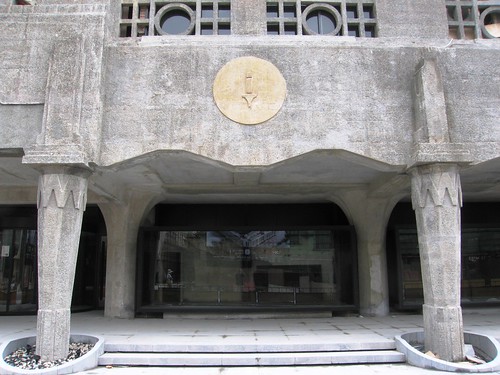
Interior ramps, corrals, and walkways.

The sinister incinerator.
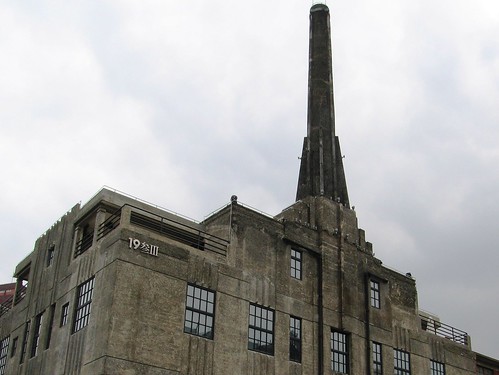
An artist's rendition of Shanghai Millfun 1933 entertainment complex.
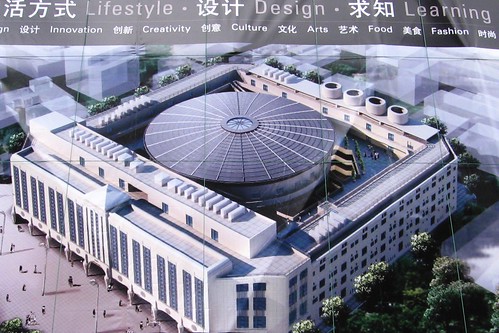
To see all the photos, click here.
The main building is fronted by an elegant art deco facade that spans 80 meters. All the slaughtering took place in the roundish building inside in the style of a Roman basilica. There are corrals everywhere for driving animals.
Across the street sits the imposing incinerator, a perfectly proportioned symmetrical building topped by two chimneys.
When originally built in 1933 this was the largest modern slaughterhouse in the Far East. In the days of the People's Republic, the building was first left unused (or continued as a slaughterhouse depending on which source you read), then manufactured pharmaceutical products, and then was storage for a hotel. Today it is being turned into an upscale shopping & entertainment area, under the name of "Shanghai Millfun 1933."
The wonderful young lady who showed us around said they have already signed up a couple of restaurants. As a vegetarian I am not sure I would be able to stomach food in a place where so many animals met their end and so much blood flowed. We also learned from her that this year's Design Week (starting 11/15) will be hosted by Millfun 1933.
There are supposed to be two other slaughterhouses like this, one in the UK and another in the US. I would love to find those and learn about their current incarnation.
Here are the photos.
The magnificent front facade.

The sturdy legs of the main entrance.

Interior ramps, corrals, and walkways.

The sinister incinerator.

An artist's rendition of Shanghai Millfun 1933 entertainment complex.

To see all the photos, click here.
Labels:
architecture,
artdeco,
shanghai,
slaughterhouse
Thursday, September 13, 2007
New lab (toys) for the road
Being the Luddites we are, we held out on the digital camera until right before we came to China. That turned out be THE greatest toy for John, even more than his guitars. In fact, we are so in love with it, we are reluctant to upgrade and decided to buy a few "accessories" for it, since taking our Thinkpad on the road is out of the question.
Here's what we bought:
Asus WL-HDD 2.5 ( Wireless AP 80Gb HD = NAS)
Transcend TS-RDM2R (Multi-Card Reader)
Nokia N800(MID - Mobile Internet Device or Tablet PC or UMPC)
With this setup, we can
Here's what we bought:
Asus WL-HDD 2.5 ( Wireless AP 80Gb HD = NAS)
Transcend TS-RDM2R (Multi-Card Reader)
Nokia N800(MID - Mobile Internet Device or Tablet PC or UMPC)
With this setup, we can
- Backup photos from the camera onto a hard drive by taking the CF card out of the camera, inserting it in the Transcend card reader, and connecting the card reader to the Asus box via mini-USB
- Get on the Internet directly with the N800 when there is a wireless connection (hopefully a free Wi-Fi hotspot) or through the Asus AP when only a wired connection is available.
- Look at photos on the hard drive with the Nokia using file sharing over the wireless LAN.
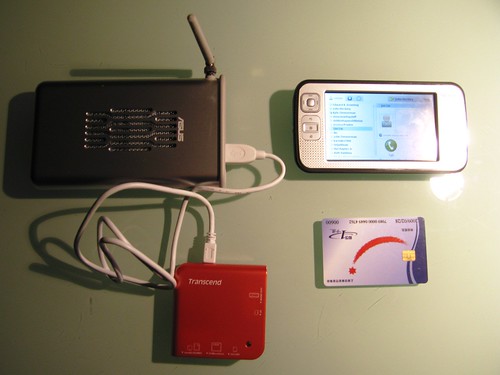
This setup is like componentizing (is that word) a laptop. We will have a full run with the new setup in Japan, where we may be found on Skype occasionally.
(Technical details:
- We have had "The 800" for 10 days now. Very good engineering. We bought a jacket for it. It runs Linux with the Opera browser.We had a fun time installing xterm/shell and trying to remember vi. ;-)
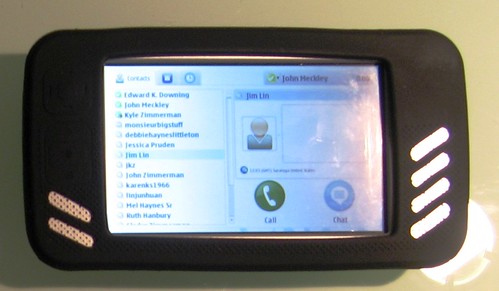
- It look me several days to find a device like the Asus. It is a wireless router as well as backup hard drive. I am so glad that they make such a device!
- We had hoped to plug the camera directly into the Asus, but we had to buy the Transcend. It is a bit of an overkill.
- Everything is working as planned, except I cannot get to CIFS to work 100% on the Nokia. Talk about ironic. The workaround is to use FTP to look at the photos.
Wednesday, September 12, 2007
I'm published!
The dream of many photographers is to get published in National Geographic. Well, I didn't get published in National Geo, but I did get a photo published in the July issue of Shanghai Talk, a local English language magazine.
[Of course we now have at least 4 copies floating around the apartment. ;-)]
They needed a wide angle photo of the Shanghai Exhibition Center for their monthly architecture column and spotted my photo on flickr. The rest is history.
Here's a scan of the mag. Excuse my boasting but it was the highlight of the summer for me. ;-)
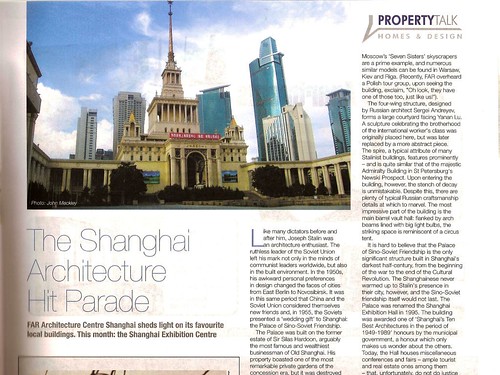
[Of course we now have at least 4 copies floating around the apartment. ;-)]
They needed a wide angle photo of the Shanghai Exhibition Center for their monthly architecture column and spotted my photo on flickr. The rest is history.
Here's a scan of the mag. Excuse my boasting but it was the highlight of the summer for me. ;-)

Tuesday, September 11, 2007
Trip Report - Nanjing and Yangzhou
Finally a brief report from our trip last Spring to Nanjing and Yangzhou. The cherry blossoms and plum blossoms were in full bloom as were the rapeseed.
Rapeseed you say? Canola oil is made from rapeseed. China is the world's largest producer of rapeseed and the fields outside Shanghai were bright yellow with rapeseed blossoms.
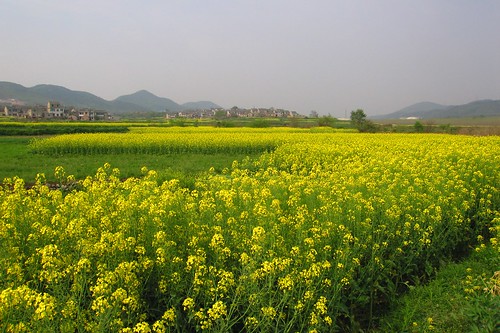
We stayed in an old Art Deco hotel in central Nanjing, checked out some historic architecture, made a side trip to Shecun Town before heading over to Yangzhou on Saturday morning.
While Nanjing, the former capital, is on the busy southern bank of the Yangtze River, Yangzhou is just an hour away on the north bank. The highlights for the tourist are Shou Xi Hu (Slender West Lake Gardens) - and the many canals that thread through the town, including the Grand Canal.
Canal lit up at night.
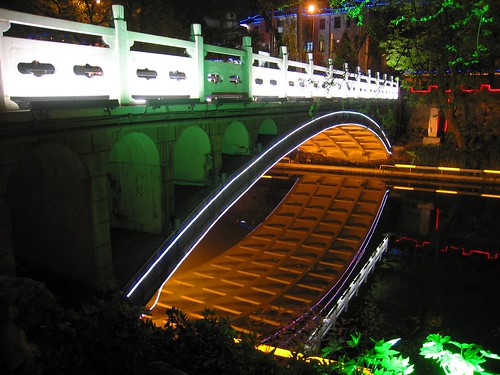
At Slender West Lake: One willow, one flowering fruit tree, one willow, one flowering fruit tree,and on and on.
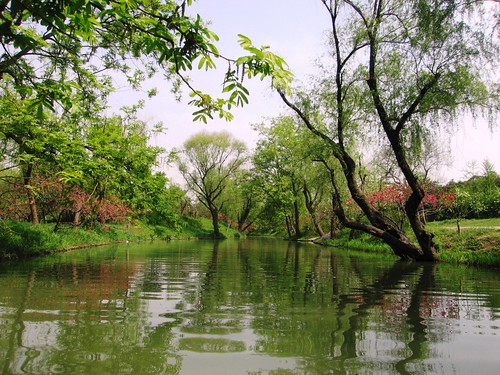
And finally the famous Five Pavilion Bridge.
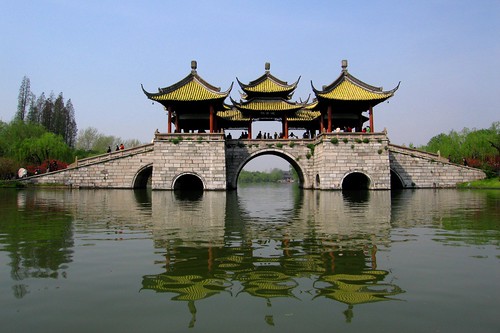
We had a great time. The photos from Nanjing and Shecun town are here.
The photos from Yangzhou are here.
And a short video of the rickety bus ride back from Shecun Town is here.
And last but not least, my experimental Google Map of Shecun Town. Feedback on this is most welcome.
View Larger Map
Rapeseed you say? Canola oil is made from rapeseed. China is the world's largest producer of rapeseed and the fields outside Shanghai were bright yellow with rapeseed blossoms.

We stayed in an old Art Deco hotel in central Nanjing, checked out some historic architecture, made a side trip to Shecun Town before heading over to Yangzhou on Saturday morning.
While Nanjing, the former capital, is on the busy southern bank of the Yangtze River, Yangzhou is just an hour away on the north bank. The highlights for the tourist are Shou Xi Hu (Slender West Lake Gardens) - and the many canals that thread through the town, including the Grand Canal.
Canal lit up at night.

At Slender West Lake: One willow, one flowering fruit tree, one willow, one flowering fruit tree,and on and on.

And finally the famous Five Pavilion Bridge.

We had a great time. The photos from Nanjing and Shecun town are here.
The photos from Yangzhou are here.
And a short video of the rickety bus ride back from Shecun Town is here.
And last but not least, my experimental Google Map of Shecun Town. Feedback on this is most welcome.
View Larger Map
Saturday, September 08, 2007
We go to a wedding OR John gives a speech
Last weekend we attended a wedding in Nantong, China, a medium-size city on the north bank of the Yangtze River, about 3 hours from Shanghai. One of my team members, Wang Ning, was getting married and she invited me to be the ZhengHunRen or "Master Witness". More about that later.
The wedding was Saturday at 6PM and early that afternoon the car that Wang Ning arranged for us arrived at 1:00 PM. The driver was one of those "professional" drivers who makes every maneuver possible to gain advantage including driving on the wrong side of the road. ;-)
We made good time and arrived at the Yangtze River Ferry at 3PM. The major cities of the Yangtze river delta - Shanghai, Nanjing, Hangzhou, Suzhou, Ningbo, and Wuxi - are south of the river. Nantong is to the north and is not as well known although she claims to be "the first modern city in China". More later.
There is a new bridge across the Yangtze just south-east of Nantong that will open next April, but for now we have to ride the ferry. The driver knew exactly how to work the system to beat the long lines and we wound up waiting for only 10 minutes instead of hours. Literally he just drove directly to the front of the line.
These ferries were similar, maybe identical, to the ones we rode this spring to cross the Yangtze at Zhenjiang. It was raining so I did not get out of the car to take photos.
We got to Nantong about 4:10. Wang Ning and soon-to-be-husband Shen Tao were waiting to greet us at the Youfei Hotel, the only 5-star hotel in Nantong. The bride and groom escorted us to our room. This was our first chance to meet the groom, an entrepreneur from Nantong, and he seemed like a really good guy.
Room 616 in tower B was excellent. We took a nice short nap before dressing and heading downstairs at 6PM for the wedding.
Sandy, who had ridden with us from Shanghai, was the sign-in lady. We signed in and had our photo taken with the bride and groom. We also had a brief chance to meet both sets of parents who were very cordial.
The Chinese pre-wedding rituals are distinctly different from those in the US. In the US, the bride and groom do not see each other the day of the wedding and the "photo taking" and "receiving line" occur between the ceremony and the reception (while I'm usually starving). ;-)
In China, the bride and groom and their families greet the guests as they arrive, photos are taken with each guest, and gifts (red packets) are received. I like it.
The wedding was on the 3rd floor in a very luxurious banquet room with 28 X 10-person tables. We were seated in the 2nd row of tables. The decorations were fabulous - lots of white flowers. See the photos.
The wedding banquet started on time at 6:48 (according to Sandy). The bride and groom walked down the aisle to the stage amid some very loud welcomes by the M.C. yes, the MC. No minister as this is the wedding ceremony not official civil marriage.
Next, I was introduced as the ZhengHunRen and I walked up to the stage with spotlights blazing, and gave my speech - in Chinese. Basically the ZhengHunRen, or Master Witness, is a respected family member, friend, work colleague, or former teacher who gives a short 3-part speech: a welcome, a few kind words about the bride and groom, and a concluding "may you be united forever, in sickness and health, etc, etc".
I was happy to get my speech over with early as I had been practicing it in Chinese for a week and was of course nervous. Much thanks to Sun-Ling and my colleagues at work for their help and encouragement.
The wedding then proceeded with all the usual bits. The tower of champagne glasses, candle lighting, toasting, exchanging of rings, eating, etc. There was a new twist that I had not seen before at a Chinese wedding - a band performed about 5 songs while we were eating.
The food was excellent and the red wine was tasty. We toasted the bride and groom, the bride's parents, the groom's parents, and finally the bride and groom again before the wedding wound down around 9PM.
We went back up to our room were I ditched my coat and tie and we headed out for stroll. The rain had stopped and we were treated to the first comfortable evening of the summer. Nantong has many canals and bridges. We made a short circuit, and on the way saw a magnificent art deco building from the early 1950's. A real gem. Awesome.
Crashed around 10:30.
Slept in a bit on Sunday. Had a very good breakfast at the hotel and then Wang Ning's parents picked us up for a short tour around Nantong. First stop: a daylight photo op at the art deco building. Second: the home of Zhang Jian (1853 - 1926), nicknamed the “King of Nantong” who started the Nantong Institute of Technology, the first textile college in China, and founded the first private museum in China. Thus the city tag line of "the first modern city in China".
Then to the nearby Wang family home. A neat old style compound. We drank tea and chatted with grandmother Wang who is the only family member living there now.
Then a brief visit to the nearby Tianning Buddhist temple - very cool. Took lots of photos.
Then over to the apartment of the newlyweds - big and new - before heading off to lunch. Finished lunch around 2PM, went back to hotel, packed, and checked out. The driver had us back at our apartment at 5:30.
It was not raining so I took a ton of photos on the ferry.
Some photos are below. To see all the photos click here.
The bride and groom greet guests and take photos.
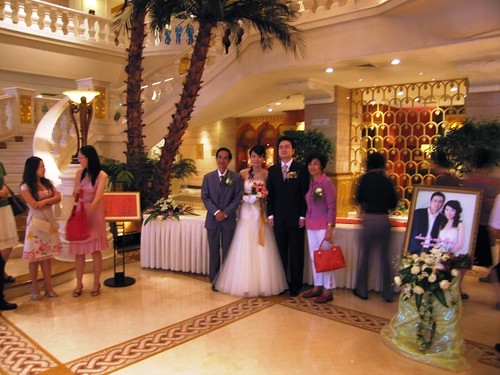
The banquet room. Check out the photos on the back wall of the bride and groom.
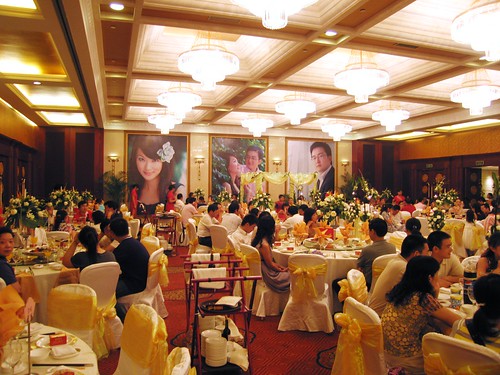
John gives a speech
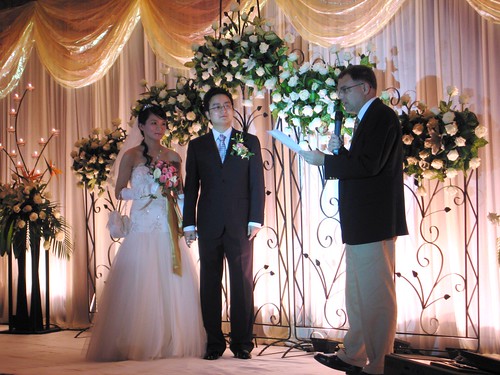
The view from the Hotel of downtown Nantong.
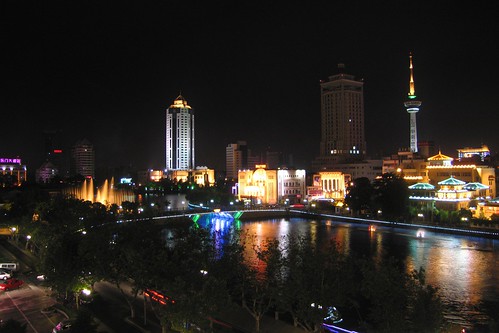
The People's Palace.
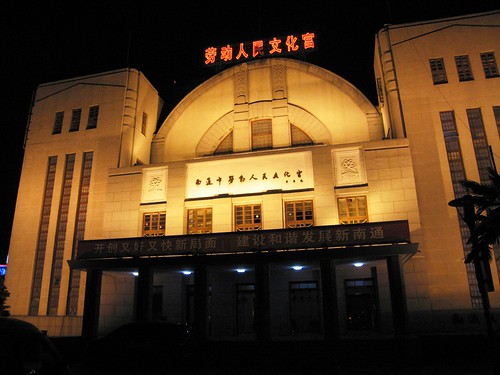
Tianning Temple
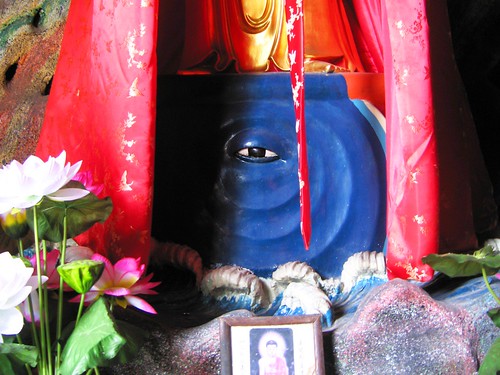
The view from the ferry
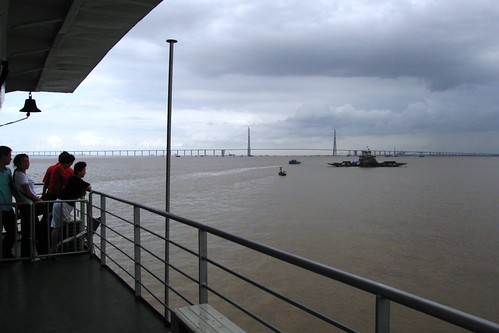
The wedding was Saturday at 6PM and early that afternoon the car that Wang Ning arranged for us arrived at 1:00 PM. The driver was one of those "professional" drivers who makes every maneuver possible to gain advantage including driving on the wrong side of the road. ;-)
We made good time and arrived at the Yangtze River Ferry at 3PM. The major cities of the Yangtze river delta - Shanghai, Nanjing, Hangzhou, Suzhou, Ningbo, and Wuxi - are south of the river. Nantong is to the north and is not as well known although she claims to be "the first modern city in China". More later.
There is a new bridge across the Yangtze just south-east of Nantong that will open next April, but for now we have to ride the ferry. The driver knew exactly how to work the system to beat the long lines and we wound up waiting for only 10 minutes instead of hours. Literally he just drove directly to the front of the line.
These ferries were similar, maybe identical, to the ones we rode this spring to cross the Yangtze at Zhenjiang. It was raining so I did not get out of the car to take photos.
We got to Nantong about 4:10. Wang Ning and soon-to-be-husband Shen Tao were waiting to greet us at the Youfei Hotel, the only 5-star hotel in Nantong. The bride and groom escorted us to our room. This was our first chance to meet the groom, an entrepreneur from Nantong, and he seemed like a really good guy.
Room 616 in tower B was excellent. We took a nice short nap before dressing and heading downstairs at 6PM for the wedding.
Sandy, who had ridden with us from Shanghai, was the sign-in lady. We signed in and had our photo taken with the bride and groom. We also had a brief chance to meet both sets of parents who were very cordial.
The Chinese pre-wedding rituals are distinctly different from those in the US. In the US, the bride and groom do not see each other the day of the wedding and the "photo taking" and "receiving line" occur between the ceremony and the reception (while I'm usually starving). ;-)
In China, the bride and groom and their families greet the guests as they arrive, photos are taken with each guest, and gifts (red packets) are received. I like it.
The wedding was on the 3rd floor in a very luxurious banquet room with 28 X 10-person tables. We were seated in the 2nd row of tables. The decorations were fabulous - lots of white flowers. See the photos.
The wedding banquet started on time at 6:48 (according to Sandy). The bride and groom walked down the aisle to the stage amid some very loud welcomes by the M.C. yes, the MC. No minister as this is the wedding ceremony not official civil marriage.
Next, I was introduced as the ZhengHunRen and I walked up to the stage with spotlights blazing, and gave my speech - in Chinese. Basically the ZhengHunRen, or Master Witness, is a respected family member, friend, work colleague, or former teacher who gives a short 3-part speech: a welcome, a few kind words about the bride and groom, and a concluding "may you be united forever, in sickness and health, etc, etc".
I was happy to get my speech over with early as I had been practicing it in Chinese for a week and was of course nervous. Much thanks to Sun-Ling and my colleagues at work for their help and encouragement.
The wedding then proceeded with all the usual bits. The tower of champagne glasses, candle lighting, toasting, exchanging of rings, eating, etc. There was a new twist that I had not seen before at a Chinese wedding - a band performed about 5 songs while we were eating.
The food was excellent and the red wine was tasty. We toasted the bride and groom, the bride's parents, the groom's parents, and finally the bride and groom again before the wedding wound down around 9PM.
We went back up to our room were I ditched my coat and tie and we headed out for stroll. The rain had stopped and we were treated to the first comfortable evening of the summer. Nantong has many canals and bridges. We made a short circuit, and on the way saw a magnificent art deco building from the early 1950's. A real gem. Awesome.
Crashed around 10:30.
Slept in a bit on Sunday. Had a very good breakfast at the hotel and then Wang Ning's parents picked us up for a short tour around Nantong. First stop: a daylight photo op at the art deco building. Second: the home of Zhang Jian (1853 - 1926), nicknamed the “King of Nantong” who started the Nantong Institute of Technology, the first textile college in China, and founded the first private museum in China. Thus the city tag line of "the first modern city in China".
Then to the nearby Wang family home. A neat old style compound. We drank tea and chatted with grandmother Wang who is the only family member living there now.
Then a brief visit to the nearby Tianning Buddhist temple - very cool. Took lots of photos.
Then over to the apartment of the newlyweds - big and new - before heading off to lunch. Finished lunch around 2PM, went back to hotel, packed, and checked out. The driver had us back at our apartment at 5:30.
It was not raining so I took a ton of photos on the ferry.
Some photos are below. To see all the photos click here.
The bride and groom greet guests and take photos.

The banquet room. Check out the photos on the back wall of the bride and groom.

John gives a speech

The view from the Hotel of downtown Nantong.

The People's Palace.

Tianning Temple

The view from the ferry

Monday, September 03, 2007
"Broken China: A dysfunctional nation"
Recently I came across a very insightful article on the Internet: Broken China: A dysfunctional nation.
Now that we have been here for almost two years, we have a better picture of China. We would like to see her having a brighter future. However, there are many things that bother us and puzzle us. This article does a better job of explaining this than we could ever do ourselves.
Now that we have been here for almost two years, we have a better picture of China. We would like to see her having a brighter future. However, there are many things that bother us and puzzle us. This article does a better job of explaining this than we could ever do ourselves.
Subscribe to:
Comments (Atom)